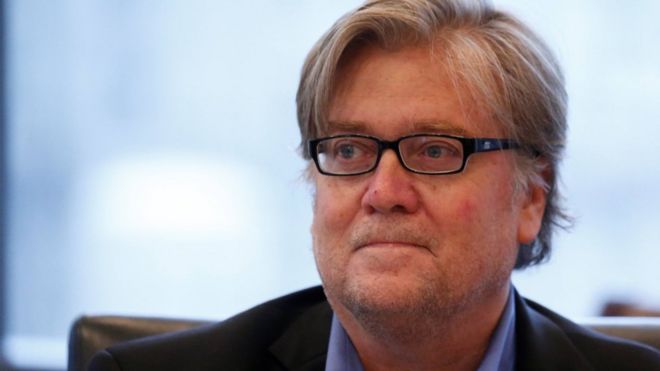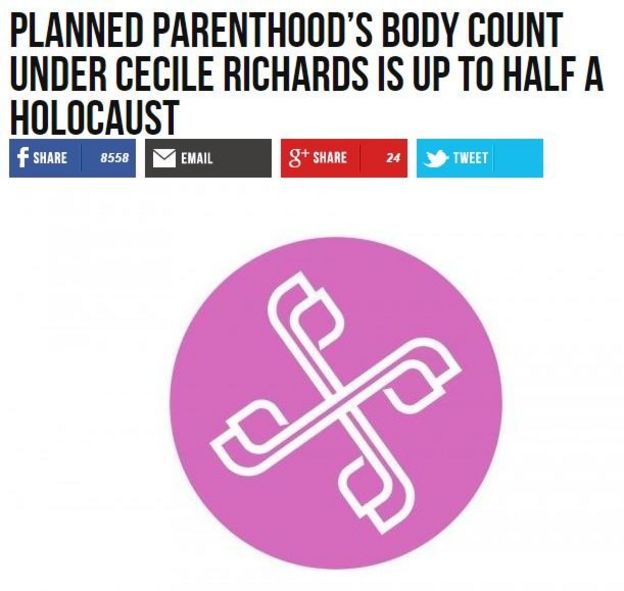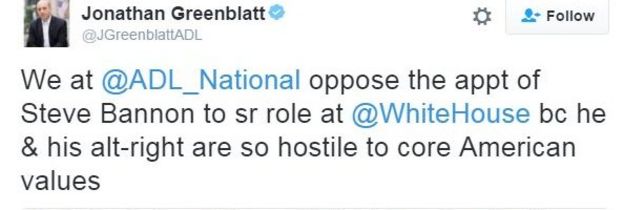
Steve Bannon, formerly the driving force behind the right-wing Breitbart News website, emerged as one of the key players in Donald Trump's White House.
He served as chief strategist, a role that gave him a direct line to President Trump. His influence was discerned in key decisions made by the president.
He was front-and-centre at the June White House event where Mr Trump announced he was withdrawing the US from the Paris climate agreement - one of Mr Bannon's top policy objectives.
But in April Mr Trump appeared to cool on Mr Bannon, declining to affirm the top aide still had his support.
He appeared to downplay Mr Bannon's role in a New York post interview, when he declared "I'm my own strategist".
After that Mr Bannon kept a somewhat lower profile, though talk of his impending removal still swirled.
Fox News founder Rupert Murdoch had reportedly badgered Mr Trump to fire the White House strategist.
Mr Bannon's appointment was at odds with the Republican mainstream, which had been the subject of repeated attacks by Breitbart.
The combative site serves up an anti-establishment agenda that critics accuse of xenophobia and misogyny.
Under Mr Bannon, it became one of the most-read conservative news and opinion sites in the US.
'Not warm and fuzzy'
Born in Virginia in 1953, Mr Bannon spent four years in the navy before completing an MBA at Harvard. He then went into investment banking and, after a spell with Goldman Sachs, moved successfully into media financing, helping to get the comedy show Seinfeld, among others, off the ground.
He shifted into film production, working in Hollywood before branching out into independent political documentary making, paying homage to former US President Ronald Reagan, former Alaska Governor Sarah Palin and the Tea Party movement.
Through this work he met Andrew Breitbart, a staunchly conservative media entrepreneur who wanted to create a site that challenged what he saw as liberal-dominated mainstream media.
When Breitbart died of a heart attack in 2012, Mr Bannon took over as head of Breitbart News and drove it forward.
The site positioned itself as a populist, bellicose, conspiracy-tinged outlet for right-wing Americans disillusioned with mainstream politicians.
"We call ourselves 'the Fight Club.' You don't come to us for warm and fuzzy," the Washington Post quoted Mr Bannon as saying in January 2016.
"We think of ourselves as virulently anti-establishment, particularly 'anti-' the permanent political class.
"We say [Republican House Speaker] Paul Ryan was grown in a petri dish at the Heritage Foundation [a conservative think-tank]."
 BREITBART
BREITBART BREITBART
BREITBART
During the election campaign, the site was fulsome in its support of Donald Trump. One piece in November 2015 called him the "John Wayne" of politics, saying "we should thank God that Trump is in this race... He will set back the destruction of America".
'White supremacist themes'
Mr Trump appointed Mr Bannon as campaign CEO in August 2016 and, following his victory, handed him a key White House role.
Democrats slammed the appointment.
Mr Bannon's appointment was also criticised by civil rights groups, including the Anti-Defamation League (ADL), which campaigns against anti-Semitism, and the Southern Poverty Law Center, a leading advocacy group against hate crimes.
 TWITTER
TWITTER
Mr Bannon reportedly engaged in a power struggle with Mr Trump's son-in-law and senior adviser, Jared Kushner, whose influence has also ebbed and flowed within the Trump administration.
He was subsequently removed from his elevated role on the crucial National Security Committee.




No comments:
Post a Comment